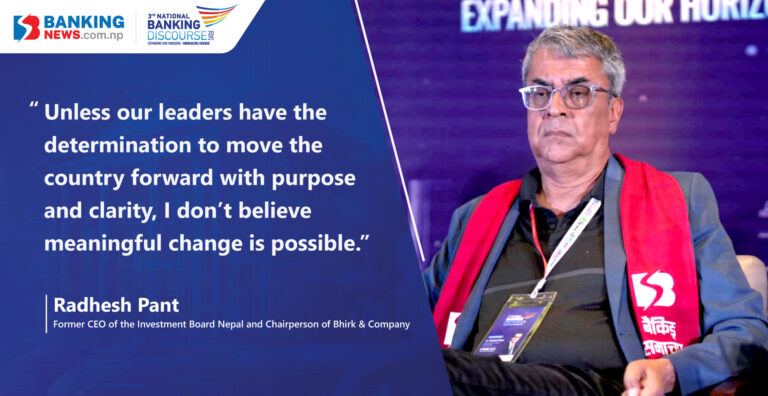Kathmandu – Radhesh Pant, former CEO of the Investment Board Nepal and Chairperson of Bhirk & Company, emphasized that Nepal’s current pace of development is not aligned with the speed it ought to be achieving. He stated that only through the proper use and management of credit can real national development take place.

Speaking during the first session of the Third National Banking Discourse 2025, themed “Challenges in Credit Expansion in Nepal: Targeted Interventions, Sectoral Adaptation, and Emerging Possibilities,” Pant noted that credit has not been able to reach the sectors that truly need it. Despite the proliferation of banks and increasing loan disbursements, he emphasized that access to credit remains uneven.
Pant observed that, historically, Nepal’s banking system has been hesitant to issue loans without collateral primarily land or property. “This practice has stifled innovation,” he said, pointing out that although the government and the central bank often speak of supporting small and medium enterprises (SMEs), many of these businesses lack collateral, creating a significant financing gap.
He expressed concern that while large businesses enjoy easy access to credit, SMEs often face a harsh environment, making credit transformation ineffective. He called on Nepal Rastra Bank to plan policies with a long-term vision of what the financial sector should look like in a few years. Only then, he suggested, could structural financial issues be properly addressed.
Pant also highlighted the need to promote and support institutions like NIFRA (Nepal Infrastructure Bank), stating that collaboration not competition with commercial banks is essential. “Infrastructure projects are inherently complex and cannot simply be executed on the basis of signatures or superficial agreements,” he warned. He advocated for broader adoption of Public-Private Partnership (PPP) models, not just for large-scale infrastructure, but also for smaller local projects. He added that bureaucratic red tape and inflexible government policies often delay implementation.
“Effective economic management demands accountability from all sides private sector, government, and Nepal Rastra Bank,” he stated. He stressed that government budgets must be impactful and result-oriented, and called for deeper concern over why many budgetary promises fail to be implemented on time.
Pant concluded by emphasizing that without clear vision and commitment from political leadership, real progress would remain elusive: “Unless our leaders have the determination to move the country forward with purpose and clarity, I don’t believe meaningful change is possible.”



 About Us
About Us
Comment